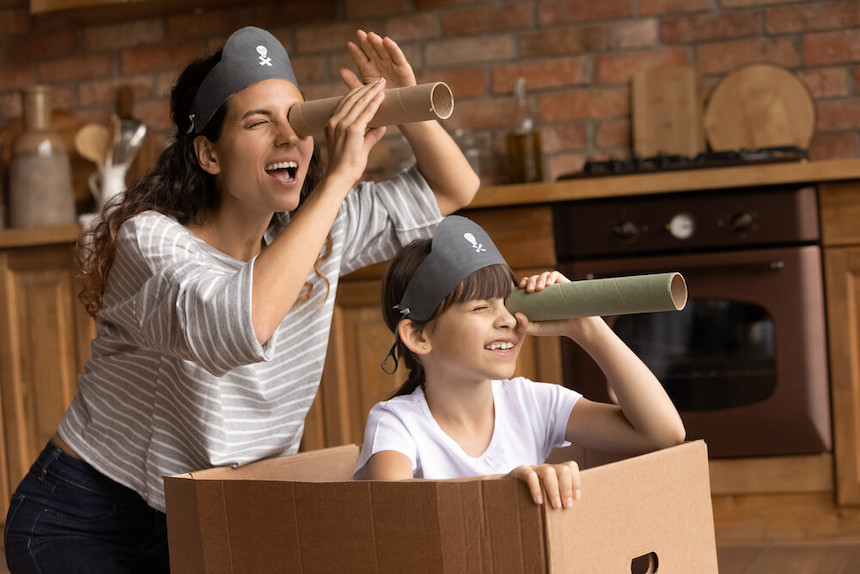
The first five years of a child’s life are in many ways the most important for their brain development. Therefore it is essential to nurture and foster children from the beginning to help their brains develop to their full potential, and imaginative play is very beneficial for this.
Due to how humans evolved to walk upright full time, our babies are born developmentally early, meaning that in the very early days when your child is a tiny baby, the bulk of their development focuses on learning to function. The short periods of the day available for play and stimulation are focused on encouraging gross motor function (such as black and white pictures to help the eyes focus and tummy time to strengthen the neck and back muscles). Quite quickly, your child will be working on fine motor function as well as they learn to sit, crawl, and feed themselves.
Our helpless babies are gone, seemingly in a flash, leaving in their place bright, funny, curious, and opinionated creatures that have started to walk and talk and who rampage around the house in a whirlwind of adorable chaos. Yes, indeed, somewhere between a year and a half, your baby has become a toddler. From this stage, there is a shift in how and what a child is learning and therefore where imaginative play becomes a crucial component of development. No longer is your little one just learning the basics of existing, but they are also learning how to be a fully functioning person with their own personality and outlook on life.
Imaginative play and thinking are essential skills to have at any age, including adulthood, when they can help with problem-solving and encourage critical thinking (allowing rational argument against other’s viewpoints that are not so agreeable). By encouraging and fostering imaginative play in the pre-school years, you are setting your child up with good learning skills for life. For ideas of activities to do, look at some parenting tips on Toddle.
There are several ways to encourage imaginative play in pre-school children. Guided play is terrific for this and allows children necessary bonding time with their parents, or other significant adults in their lives, at the same time. The activities you do with your pre-schooler don’t need to be complicated or expensive either; there are plenty of free or cheap activities you can do together.
Dressing up, whether it be in your old clothes or in costumes bought specifically, allows young children to step outside of themselves and imagine themselves are a different version of themselves or as another character altogether. In this way, they can act out scenarios from their favorite stories, helping them to connect to beloved characters, or they can act out wholly new scenarios pulled from their heads fresh and new.
Going for a walk around your neighborhood and discussing the world around you is a very engaging activity, and it’s very simple to bring an element of imagination into it. Dress suitably for the weather and get out there during the different seasons; discuss the various things you find – in the summer, are there bees in the flowers? Talk about why the bees love flowers so much, how they make the honey we spread on our toast, and how they help fruit grow. Can your little one imagine that they are buzzing about like a fuzzy bee, finding flowers to land on? Not only are they learning to think outside of their own head, but it is reinforcing the ideas you are introducing them to by keeping them engaged in the subject.
It is also important to remember that pre-school children need downtime too. Their attention spans are not long at all, so while they do enjoy the guided activities you do together, they will lose interest quicker than older children and seem to flit from activity to activity. Allowing them unstructured time to play alone gives little ones time to process and decompress while also encouraging the ability to entertain themselves. Again, remember their attention span is short, so don’t leave them to play alone for a long time, but 20 minutes in a safe space while you make dinner, is very beneficial for a pre-schooler and will help you in the long term too. A demanding ten-year-old who has never learned to entertain themselves for short periods is very draining, so setting the foundation in place early on is an important thing to do.
- How To Boost Your Confidence on a First Date - February 23, 2024
- 5 Must-Try Fashion Trends for 2024 - February 14, 2024
- 12 Must-Have Items for Your Daughter’s Gift Basket - November 28, 2023






